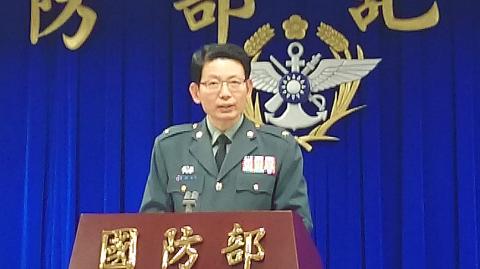The Ministry of National Defense (MND) yesterday confirmed that two military intelligence officers imprisoned in China for nearly a decade were released and returned to Taiwan in mid-October, adding that it was not related to any spy swap deal with China.
Presidential Office spokesman Charles Chen (陳以信) said the release was the result of mutual good will demonstrated by both sides of the Taiwan Strait at the landmark meeting between President Ma Ying-jeou (馬英九) and Chinese President Xi Jinping (習近平) in Singapore last month.
“President Ma is pleased to see Mr Chu [Chu Kung-hsun (朱恭訓)] and Mr Hsu [Hsu Chang-kuo (徐章國)] being able to unite with their families. He also hopes that both sides’ good-intentioned interactions can be continued and lead to more concrete results in the future,” Chen said.

Photo: Lo Tien-pin, Taipei Times
Chu, a former deputy department head of the Bureau of Military Intelligence (BMI), and Hsu, a former section chief of the bureau, were given a life sentence each for espionage while carrying out their official duties in China in 2006, MND spokesperson Major General David Lo (羅紹和) said.
After being imprisoned for more than nine years, they were released and returned to Taiwan on Oct. 13.
Lo said that after the two military intelligence officers were given a life sentence, the government had done everything possible to secure their release since 2008.
Lo also said the government expressed the highest respect and gratitude for the dedication of the two officers and the ordeals of their families and would do its utmost to take care of their interests and compensate them.
They are the highest-ranking Taiwanese agents ever to fall into Chinese hands, according to a local newspaper.
The Chinese-language China Times, which first reported news of the swap, also said Taiwan later agreed to release Li Zhihao (李志豪), a Chinese spy serving a life sentence in Taiwan, in late October, adding it was the first time that both sides of the Strait swapped spies, which it described as an “ice-breaking” move that was historically and politically significant.
However, Lo denied there was any spy swap deal.
“Their release and return to Taiwan in mid-October has nothing to do with a spy swap deal,” Lo said.
Lo said Li has served part of his term, and requested parole many times before it was granted in late October.
On whether China has requested the release of former Army Major General Lo Hsien-che (羅賢哲), believed to be the highest-ranking Taiwanese officer to be caught spying for China in nearly five decades, the ministry spokesman said he does not know anything about it and that Lo Hsien-che is still serving his life sentence.
He said there are no BMI officers still detained in China.
Of those that have been detained for assisting the work of BMI officers, he said that they were either being released through parole or after having completed their terms.
The government would do everything possible to secure the release of those who are still detained, he added.
Additional reporting by Stacy Hsu

DEFENDING DEMOCRACY: Taiwan shares the same values as those that fought in WWII, and nations must unite to halt the expansion of a new authoritarian bloc, Lai said The government yesterday held a commemoration ceremony for Victory in Europe (V-E) Day, joining the rest of the world for the first time to mark the anniversary of the end of World War II in Europe. Taiwan honoring V-E Day signifies “our growing connections with the international community,” President William Lai (賴清德) said at a reception in Taipei on the 80th anniversary of V-E Day. One of the major lessons of World War II is that “authoritarianism and aggression lead only to slaughter, tragedy and greater inequality,” Lai said. Even more importantly, the war also taught people that “those who cherish peace cannot

STEADFAST FRIEND: The bills encourage increased Taiwan-US engagement and address China’s distortion of UN Resolution 2758 to isolate Taiwan internationally The Presidential Office yesterday thanked the US House of Representatives for unanimously passing two Taiwan-related bills highlighting its solid support for Taiwan’s democracy and global participation, and for deepening bilateral relations. One of the bills, the Taiwan Assurance Implementation Act, requires the US Department of State to periodically review its guidelines for engagement with Taiwan, and report to the US Congress on the guidelines and plans to lift self-imposed limitations on US-Taiwan engagement. The other bill is the Taiwan International Solidarity Act, which clarifies that UN Resolution 2758 does not address the issue of the representation of Taiwan or its people in

US Indo-Pacific Commander Admiral Samuel Paparo on Friday expressed concern over the rate at which China is diversifying its military exercises, the Financial Times (FT) reported on Saturday. “The rates of change on the depth and breadth of their exercises is the one non-linear effect that I’ve seen in the last year that wakes me up at night or keeps me up at night,” Paparo was quoted by FT as saying while attending the annual Sedona Forum at the McCain Institute in Arizona. Paparo also expressed concern over the speed with which China was expanding its military. While the US

‘FALLACY’: Xi’s assertions that Taiwan was given to the PRC after WWII confused right and wrong, and were contrary to the facts, the Ministry of Foreign Affairs said The Ministry of Foreign Affairs yesterday called Chinese President Xi Jinping’s (習近平) claim that China historically has sovereignty over Taiwan “deceptive” and “contrary to the facts.” In an article published on Wednesday in the Russian state-run Rossiyskaya Gazeta, Xi said that this year not only marks 80 years since the end of World War II and the founding of the UN, but also “Taiwan’s restoration to China.” “A series of instruments with legal effect under international law, including the Cairo Declaration and the Potsdam Declaration have affirmed China’s sovereignty over Taiwan,” Xi wrote. “The historical and legal fact” of these documents, as well